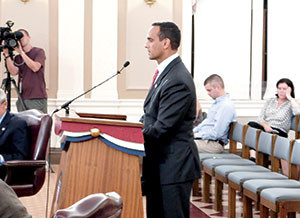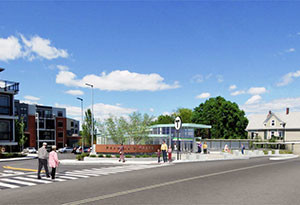
Mayor Curtatone briefed the Board of Aldermen on recent developments in the GLX funding issues currently being addressed by the administration and state officials. — Photo by Donald Norton
By Jim Clark
The recent announcement by the Massachusetts Bay Transit Authority that the Green Line Extension project may be facing a $1 billion shortfall in its budget sent many concerned individuals and institutions into a tailspin of near panic and clear confusion.
Since that announcement, Mayor Curtatone has been actively vocal in the press and behind the scenes, assuring all concerned parties that the situation is not as dire as some have feared. In fact, the mayor effuses positively on the likelihood of the GLX’s completion, albeit with some creative modifications to the original plans.
The mayor made a detailed, full-length presentation to the Board of Aldermen at they regular meeting last Thursday evening, outlining what has been happening in terms of negotiating a solution to the current status of the situation and where it is likely to be heading.
The following are highlights of the mayor’s remarks:
“I am very confident the Green Line is going to continue to be constructed. It’s under construction now as we speak. It will be built.”
“We have what has been reported a status facing an increase in projected costs. I wouldn’t term it a shortfall. It’s not an over-line.”
“The construction you see in the streets of Somerville today, the more than $300 million dollars worth of contracts being executed today – and that doesn’t include the $200 million in steel that’s on its way – is a certain set of contracts.”
“The most recent set of contracts that came back from bidding process of procurement came back with a much more significant cost than projected by the state’s independent cost estimators and their other expert analysts.”
“We had been kept up-to-date somewhat that they’re getting bids in and they’re little concerned about certain costs in recent days before the updates of the Control Board made us aware of what that number is, and as you have seen reported, upwards possibly of $1 billion.”
“I want to speak a little bit as to what I think drives their dynamic. It has been reported to us, the city, from the state, that they have heard from the feds that across the country these direct costs of these types of projects are increasing significantly. And you can imagine, we are now, despite the performance of the Dow, still in a good economy. A strong economy. Access to materials, good and labor are at a premium.”
“We know in this project the Commonwealth used a new procurement process instead of construction management at risk. And questions as to whether or not the procurement process incentivized or did not incentivize more completion and drove the costs up, because there might have been more inherent risks, arguably, from the contractor.”
“At the end of the day, we have what is a significant projected increase in costs as we move forward.”
“Now let me state, there is no delay today. Construction is moving forward. The state had a responsibility to update the public and Control Board as to what is projected in increased cost. And before they move forward on the next major piece of the construction, their goal – rightfully so, and prudently so – is to try to reduce that $1 billion number.”
 “The Commonwealth, under Secretary Pollock and Frank DePaola, have put forth a set of parameters of how they will work with us, the community, the City of Somerville, and all necessary agencies to trim down that cost. I submit that they will be able to trim that cost down working together. The approach will be, as has been stated, around several areas. One, to examine the scope of the project. Perhaps adjust the scope. And value engineer pieces of the project. So, for example, if you look at many of the stations on the Green Line Extension project many could be value engineered down to be very accessible, very functional, and very modern at a lesser steel and save costs.”
“The Commonwealth, under Secretary Pollock and Frank DePaola, have put forth a set of parameters of how they will work with us, the community, the City of Somerville, and all necessary agencies to trim down that cost. I submit that they will be able to trim that cost down working together. The approach will be, as has been stated, around several areas. One, to examine the scope of the project. Perhaps adjust the scope. And value engineer pieces of the project. So, for example, if you look at many of the stations on the Green Line Extension project many could be value engineered down to be very accessible, very functional, and very modern at a lesser steel and save costs.”
“So, if have down the road a particular developer in a particular development area that wanted to enhance the stand of the station they could they could invest in that. That could save costs. The Commonwealth is going to negotiate directly with the general contractor on direct and indirect cost as is part of the process to negotiate down that number. Other contractors are going to examine fully the procurement process here and ask themselves should we go back on the bid altogether, but what is the consequence of that in terms of time, delay and money? Should we portion out, take pieces of the project? For instance, the maintenance facility, not only value engineer that but contract it up, the traditional procurement processes. We’re going to look at that. They’re examining – and we agree – different value capture tools. The Commonwealth, for example, utilizes I.Q. Somerville has set the standard and the model for the Commonwealth for what we did in Assembly Square, a model of public-private partnership. We used value capture tools, DIF for our own purposes and infrastructure. I.Q.ed, where the state takes the net new increases or net new broad based tax revenues on income and sales tax to pay off bonds and pay for infrastructure. Those types of value capture tools are most appropriate, directly appropriate in specified designated development area where you’re going to have intense development, where you’re going to have that type of growth.”
“So the Commonwealth is taking a holistic approach, rightfully so, we agree with the approach. We are very confident that in the very near future we will come to a number that is much more predictable, clear, that helps us build our best Green Line project where the taxpayers, and the people of the Commonwealth, not just Somerville.”
“What’s at stake here for the whole Commonwealth is the most transformative transportation project in generations. In the corridor of Cambridge, Somerville and Medford, what stands to be gained, conservatively, is 18M square feet of new development.”
“The Secretary has made clear that everything is on the table, including cancellation. Sure, of course. That’s part of the proven analysis. But the Secretary also stated to the Control Board that cancellation is not realistic because we lose the economic opportunity and the environmental benefits. There are hundreds of millions of dollars in contracts being executed right now, the hundreds of millions of dollars being spent on the steel that’s coming in, and the federal money. So let’s just say – the most nightmare scenario – there will be no Green Line project. We would have spent hundreds of millions of dollars in the Commonwealth – taxpayer’s money – for nothing. Or, there always has to be more liability to be paid, more than anticipated, to reap all the benefits from the economic part, the environment, that the entire Commonwealth will benefit from.”
“I will state to the public not to panic. I understand there is some concern, there’s never good timing for this sort of news. It’s not a question of if we do it, it’s how are we going to get this done?”
After the mayor’s main presentation, he invited members of the Board to ask questions. Board President William A. White, Jr. questioned the idea that significant delays in the project could be avoided. The mayor responded that certain delays could be possible, but that as a workable solution to the budgetary problems is eventually achieved any such delays would be negligible.
Ward 2 Alderman Maryann Heuston expressed gratitude to the mayor for making the report to the Board, and also said she was relieved to hear that the Union Square spur is being recognized as a vital part of the GLX project.
The mayor responded, saying, “The federal government supports this project because of the benefits we fought for and advocated as a reason to be done for so many years as a community.”
Alderman-at-Large Jack Connolly similarly expressed relief with the mayor’s report and specifically asked about timeline slippage for the Union Square station into 2018, a shift from the original 2017 estimate. The mayor indicated that this might be a possibility, but also fell in line with ancillary issues that reached beyond the budgetary factors.
Connolly also asked the mayor if the future development of the Community Path was at risk in light of the present budgetary issues. The mayor responded saying that although the Community Path extension was on the table as being subject budget cuts, he would press to have it continue as planned.















Reader Comments